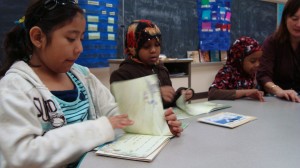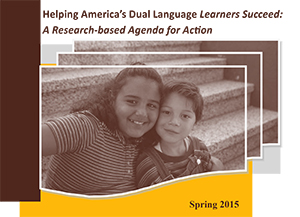
Through our Pathway Schools Initiative, McKnight partners with seven schools in the Twin Cities — as well as the University of Chicago’s Urban Education Institute — to align and improve the quality of literacy instruction from PreK-3rd grade. Dual Language Learners (DLLs) make up nearly two-thirds of the student population in our Pathway Schools — across Minneapolis and St. Paul, DLLs represent approximately one-third of all students and are the fastest growing demographic in Minnesota schools. We view these bilingual students as a key asset for Minnesota – strengthening our cultural diversity and improving our global economic competitiveness.
However, these aspirations will be realized only if DLLs receive effective educational supports. In 2014, only 64 percent of language learners in Minnesota graduated from high school on time — compared to 76 percent of all students. Only 24 percent of DLL third graders in Minnesota read proficiently — a metric that research demonstrates is highly predictive of future academic success.
Our Pathway Schools partners are eager to provide an excellent education for their DLL students, but find that research, policy, and practice often lags behind the reality in their classrooms. In recent years, therefore, McKnight has invested considerable effort into gathering, understanding, and sharing information about how best to serve DLLs in Minnesota classrooms. In October 2014, we partnered with the Heising-Simons Foundation and the University of Arizona to sponsor a two-day summit focused on translating research into effective practice for DLLs. As part of the convening, we commissioned a set of papers to provide evidence-based recommendations for improving instruction, assessment, and school leadership in settings serving large numbers of DLLs.
 We also asked scholars to propose a set of policy advances and levers for increasing DLL achievement and to suggest strategies for improving the human capital pipeline — ensuring that we prepare, recruit, and retain educators who can engage and support DLLs.
We also asked scholars to propose a set of policy advances and levers for increasing DLL achievement and to suggest strategies for improving the human capital pipeline — ensuring that we prepare, recruit, and retain educators who can engage and support DLLs.
We’re pleased to announce that these five papers are now available on McKnight’s website, and we hope that educators, system leaders, and policymakers will use them to guide their planning and decision-making. The recommendations in all five papers are aggregated and expanded on in the brief “Helping America’s Dual Language Learners Succeed: A Research-Based Agenda for Action,” also available for download on our website.
As McKnight and its partners works to ensure that Minnesota cultivates one its greatest assets — our Dual Language Learners, we will continue to share what we discover so that our colleagues in education philanthropy, advocacy, and practice can translate ideas into action.


